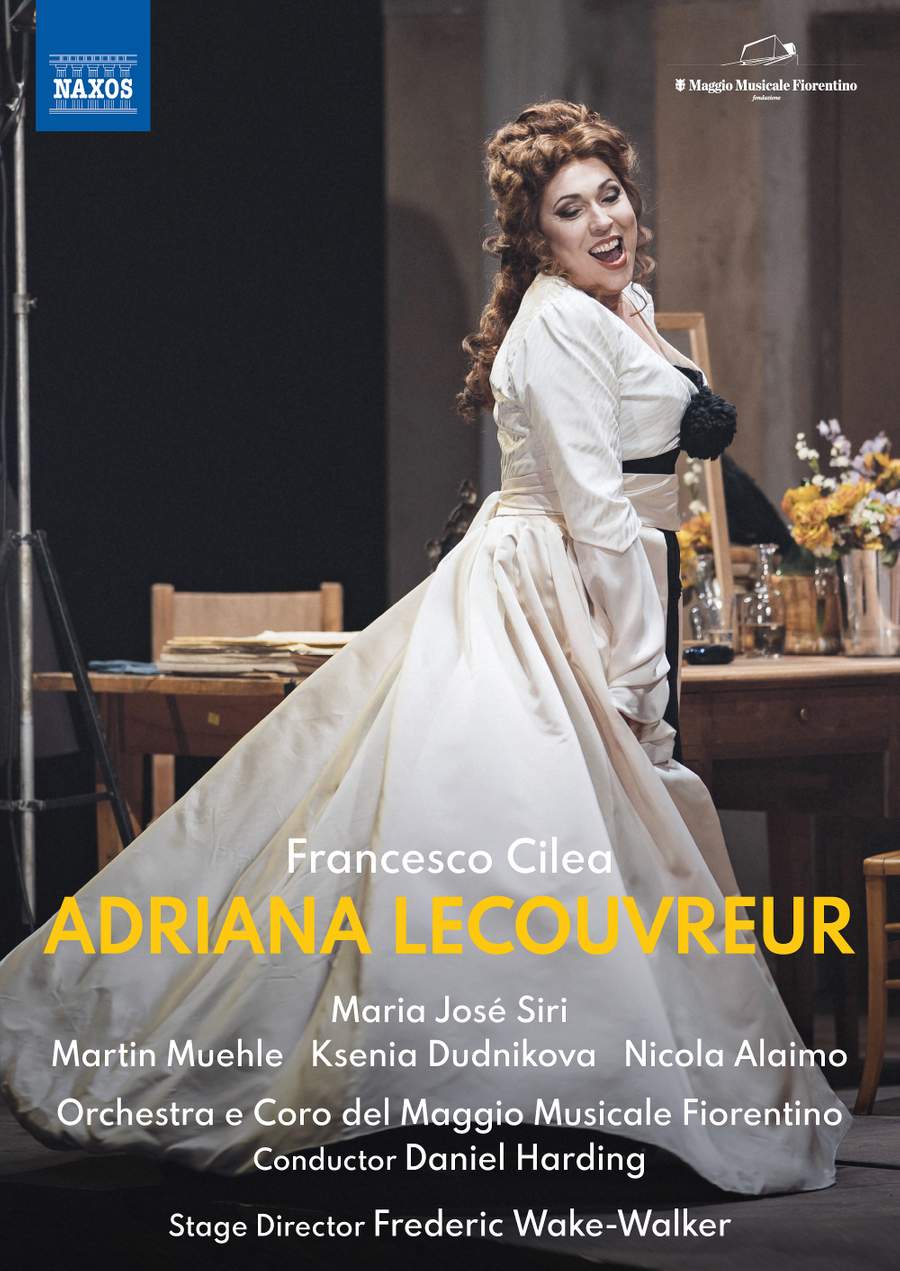CILEA Adriana Lecouvreur (Harding)
View record and artist detailsRecord and Artist Details
Genre:
Opera
Label: Naxos
Magazine Review Date: 01/2023
Media Format: Digital Versatile Disc
Media Runtime: 143
Mastering:
DDD
Catalogue Number: 2 110737

Tracks:
| Composition | Artist Credit |
|---|---|
| Adriana Lecouvreur |
Francesco Cilea, Composer
Alessandro Spina, Prince de Bouillon, Bass Antonio Garés, Poisson, Tenor Chiara Mogini, Mlle Jouvenot, Mezzo soprano Daniel Harding, Conductor Davide Piva, Quinault, Bass Florence Maggio Musicale Chorus Florence Maggio Musicale Orchestra Ksenia Dudnikova, Princess de Bouillon, Mezzo soprano Maria José Siri, Adriana, Soprano Martin Muehle, Maurizio, Tenor Michele Gianquinto, Major-Domo, Bass Nicola Alaimo, Michonnet, Baritone Paolo Antognetti, Abbé de Chazeuil, Tenor Valentina Corò, Dangeville, Soprano |
Author: Tim Ashley
Theatre as artifice is the dominant idea behind Frederic Wake-Walker’s production of Adriana Lecouvreur – appropriately enough, perhaps, for an opera about an actress whose grasp of the dividing line between art and reality is sometimes precarious, and who ultimately courts disaster by inflecting a speech from Racine’s Phèdre so as to publicly humiliate a rival in love. Wake-Walker can, however, be an uneven director, whose work frequently divides opinion: I remember being as mesmerised by his beautiful 2013 staging of Britten’s Burning Fiery Furnace in Southwark Cathedral as I was perplexed by his 2021 Glyndebourne Fidelio, with its revamped narrative and overloaded imagery drawn from Michel Foucault’s Discipline and Punish. His Adriana, unsurprisingly, may well leave you in two minds: I found it reductive and captivating by turns.
We are never allowed to forget for a second that what we are watching is an illusion. Polina Liefers’s sets, swivelling between a backstage dressing area and a Palladian villa, are very obviously pasteboard, and to underscore the point, Tiziano Mancini’s camera sometimes takes us into the wings so that we can see the struts and boards from which they’re constructed. The direction, meanwhile, is often stylised and anti-naturalistic, sometimes dependent on grand gestures that can be seen as self-consciously operatic, sometimes pushing towards cabaret or revue.
Maria José Siri’s Adriana and Ksenia Dudnikova’s Princesse square off in their Act 2 confrontation not only as enemies but as rival divas, posturing in follow spots on opposite sides of the stage. The duet between Alessandro Spina’s Prince and Paolo Antognetti’s Abbé is a music-hall soft-shoe shuffle complete with boaters and canes, while Maurizio’s narrative about his recent exploits on the battlefield becomes a big production number that would not look out of place in Oh! What a Lovely War. Anna Olkhovaya’s choreography is superb, and the updating to the time of composition allows her to introduce Venus, in the ‘Judgement of Paris’ divertissement, as Loie Fuller, swathed in swirling veils. You can’t help but feel, however, that Wake-Walker overstates his case throughout, and that the opera has effectively been subsumed into a single idea, but it’s slickly done and often extremely engaging.
It sounds excellent, too. It comes as something of a surprise to hear Daniel Harding in a repertory with which we wouldn’t usually associate him, but he conducts it wonderfully well. The playing is admirably sensuous: Cilea knew his Wagner and Debussy, and Harding pointedly emphasises the debts, while also giving us plenty of Italianate passion and lyricism. Siri takes a while to settle. A couple of moments of uncertainty in her lower registers intrude on ‘Io son l’umile ancella’ but later on the voice blazes resplendently. She’s good, if rather grand in manner, in the Racine recitations, and wonderfully fiery in her duets with Martin Muehle’s handsome Maurizio, bronzed in tone, very much in the Mario Del Monaco mould. Dudnikova, however, is arguably the real star, magnificent in her malign dignity and wonderfully incisive in her use of both her dark chest register and the terrific gleam at the top of her voice. Spina and Antognetti make a fine double act, clearly enjoying the deliciously scurrilous music that Cilea gives them, and Nicola Alaimo is touching as Michonnet, the stage director who loves Adriana from afar but who is never able to express his feelings. It’s well worth hearing, whatever you may think of Wake-Walker’s interventions.
Discover the world's largest classical music catalogue with Presto Music.

Gramophone Digital Club
- Digital Edition
- Digital Archive
- Reviews Database
- Full website access
From £8.75 / month
Subscribe
Gramophone Full Club
- Print Edition
- Digital Edition
- Digital Archive
- Reviews Database
- Full website access
From £11.00 / month
Subscribe
If you are a library, university or other organisation that would be interested in an institutional subscription to Gramophone please click here for further information.




